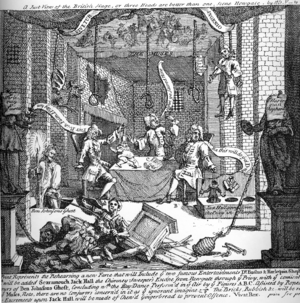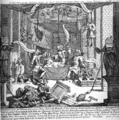Robert Wilks facts for kids
Robert Wilks (born around 1665 – died September 27, 1732) was a famous British actor and theatre manager. He was one of the main people in charge of the Theatre Royal, Drury Lane when it was very popular in the 1710s.
Wilks, along with Colley Cibber and Thomas Doggett, formed a group of three actor-managers. This group was sometimes criticized by famous writers like Alexander Pope and artists like William Hogarth. They were seen by some as changing theatre standards, but they also made theatre very exciting for audiences.

Contents
Early Life and Acting Career
Robert Wilks's family lived in Bromsgrove, Worcestershire, for many years. His great-uncle, Judge Wilks, helped Charles I of England during the English Civil War. After Oliver Cromwell won the war, Robert's father moved to Dublin, Ireland, where Robert was born.
Robert first worked as a clerk for Robert Southwell. Later, he joined the army of King William III. After leaving the army, he started acting at the Smock Alley Theatre in Dublin from 1691 to 1693. Wilks said he first acted in an amateur play of Othello by his army company. He was so good that he decided to become a professional actor.
In 1693, Christopher Rich, who managed the Drury Lane theatre, hired Wilks to work in London. That same year, Wilks married Elizabeth Knapton.
Becoming a Star Actor
By 1698, Wilks was back in Dublin, performing in plays by George Etherege. He became very popular there. The next year, he began working closely with the playwright George Farquhar. Farquhar and Wilks were good friends and traveled from Dublin to London together.
In 1699, Wilks played the character Harry Wildair in Farquhar's play The Constant Couple. This role became his most famous, making him very popular with young women in London. For the rest of his life, Harry Wildair was almost like Wilks's second identity. Wilks continued to star in many of Farquhar's plays.
Rise to Theatre Management
At Drury Lane, Christopher Rich was a very strict theatre manager. In 1702, Rich had to choose between Wilks and George Powell, who directed rehearsals. Wilks won this power struggle, and Powell left. Wilks was then promoted to director of rehearsals. This gave Wilks a lot of power within the theatre.
In 1706, many actors went on strike. They accused Rich of taking too much of their earnings. The main actors, including Wilks, left to perform at the Queen's Theatre in Haymarket. Rich and his son, John Rich, responded by putting on opera and pantomime shows.
The Triumvirate of Managers
At the Haymarket, Wilks was a big star. He played major roles in famous plays like 1 Henry IV, Hamlet, Julius Caesar, and The Way of the World. He also starred in new plays like Farquhar's The Beaux' Stratagem and Nicholas Rowe's The Royal Convert.
In 1709, Wilks, along with Cibber, Thomas Doggett, and Anne Oldfield, started helping to manage the Haymarket theatre with Owen Swiny. The next year, this group returned to Drury Lane. By 1711, they became the official actor-managers of Drury Lane. Thomas Doggett left the group, and Owen Swiny returned to Haymarket. This left Wilks, Cibber, and Doggett (later replaced by Booth) as the "triumvirate" of managers.
These three managers had very busy and profitable jobs. From 1711 to 1714, they likely earned a lot of money, possibly over £1,000 a year, which was a huge sum back then.
In 1713, Barton Booth replaced Doggett as an actor-manager. In 1714, Richard Steele joined them. Steele helped the theatre get a special royal patent. This patent allowed the company to put on plays without needing a separate license for each one. This patent became very valuable. When Steele died in 1729, the three remaining managers each got a share of this important patent.
Later Life and Legacy
The managers were very busy with running the theatre and also acting. For example, Wilks performed in 140 shows during the 1721–22 season! He rarely performed outside of London, except for one trip to Dublin in 1711. Wilks was a key part of Drury Lane, both as a manager and as a popular leading actor.
Colley Cibber, another manager, wrote about Wilks. Cibber described Wilks as a bit vain and easily angered. Famous writers like Alexander Pope and artists like William Hogarth sometimes made fun of Wilks and the other managers. Hogarth, for instance, drew Wilks making a pantomime play using scripts for Hamlet as toilet paper. This was a way to criticize the managers for focusing on simple, cheap shows instead of serious plays.
Robert Wilks died in London in 1732 and was buried in St. Paul's Church, Covent Garden. He had earned a lot of money during his life.
Wilks had a daughter named Jane Rogers with the actress Jane Rogers. His daughter also became an actress and performed at theatres like Lincoln's Inn Field and Covent Garden.
Images for kids
-
A print by William Hogarth from 1724. It shows Robert Wilks, Colley Cibber, and Barton Booth rehearsing a play with puppets.
 | Selma Burke |
 | Pauline Powell Burns |
 | Frederick J. Brown |
 | Robert Blackburn |


